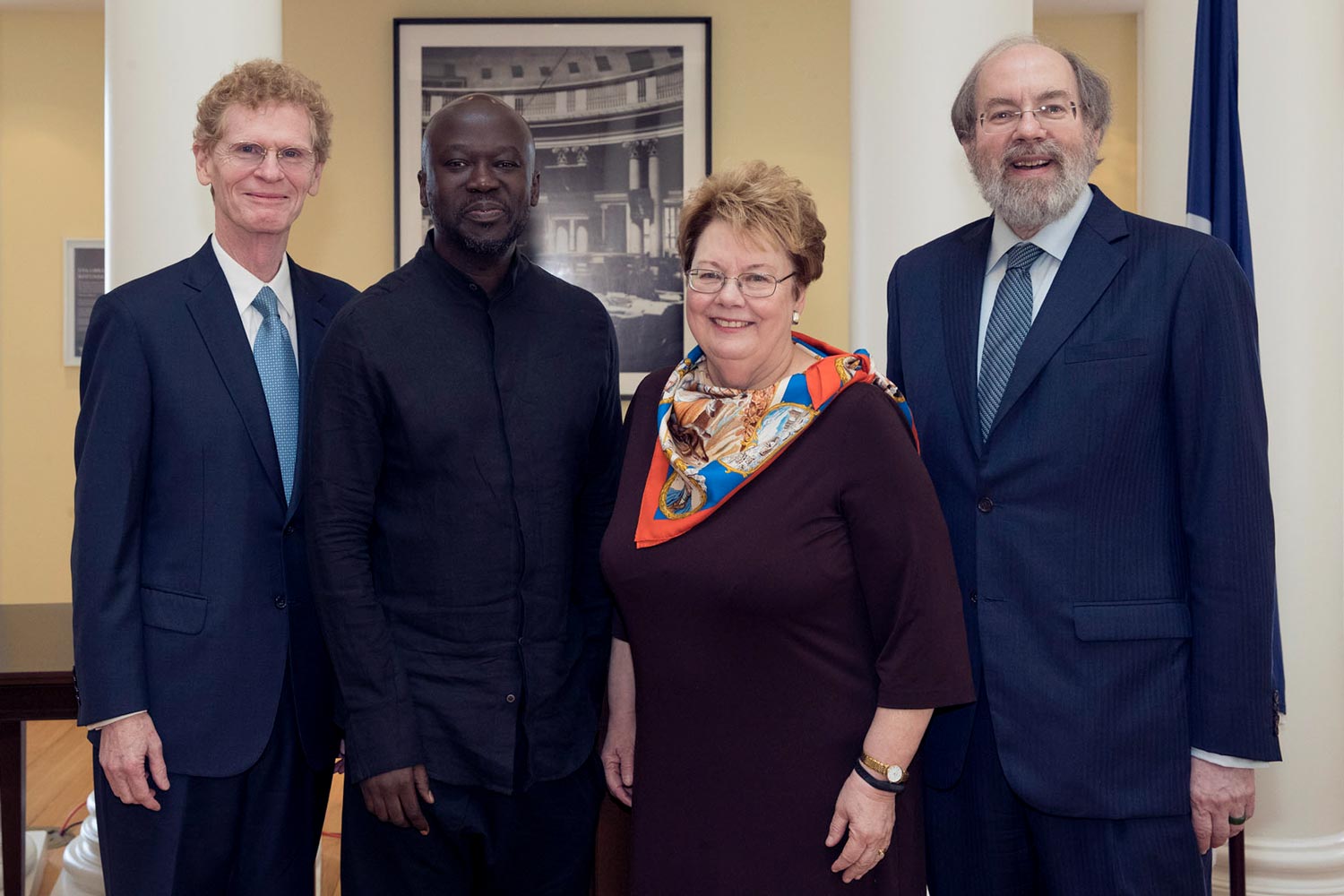On Friday, the University of Virginia marked founder Thomas Jefferson’s 275th birthday by awarding its highest external honors, the Thomas Jefferson Foundation Medals, to honor extraordinary achievements in fields the third president admired.
The University and the Thomas Jefferson Foundation at Monticello – the independent, nonprofit organization that owns and operates Monticello – jointly awarded the medals in Architecture, Citizen Leadership and Law during the Founder’s Day festivities on Friday. Each medalist also gave a talk on Grounds.
The 2018 recipients were Sir David Adjaye OBE, a globally acclaimed architect and one of the lead designers of the Smithsonian Institution National Museum of African American History and Culture in Washington, D.C.; Morgan Carrington “Cary” Fowler Jr., an agriculturalist who led the conservation of more than 930,000 seed varieties in the Svalbard Global Seed Vault, the world’s largest collection of crop diversity; and Judge Frank H. Easterbrook of the U.S. Court of Appeals for the Seventh Circuit, known for his expertise in antitrust law, criminal law and procedure and corporate law.
UVA President Teresa A. Sullivan and Leslie Greene Bowman, president and CEO of the Thomas Jefferson Foundation at Monticello, presented the medals during a luncheon at the University. Recipients were also honored Thursday with a private dinner at Monticello.
Before the luncheon, Sullivan presided over a tree-planting ceremony honoring Environmental Programs Manager Jeff Sitler. Each year on Founder’s Day, the University plans a tree to celebrate an individual who has made lasting contributions to the UVA community.
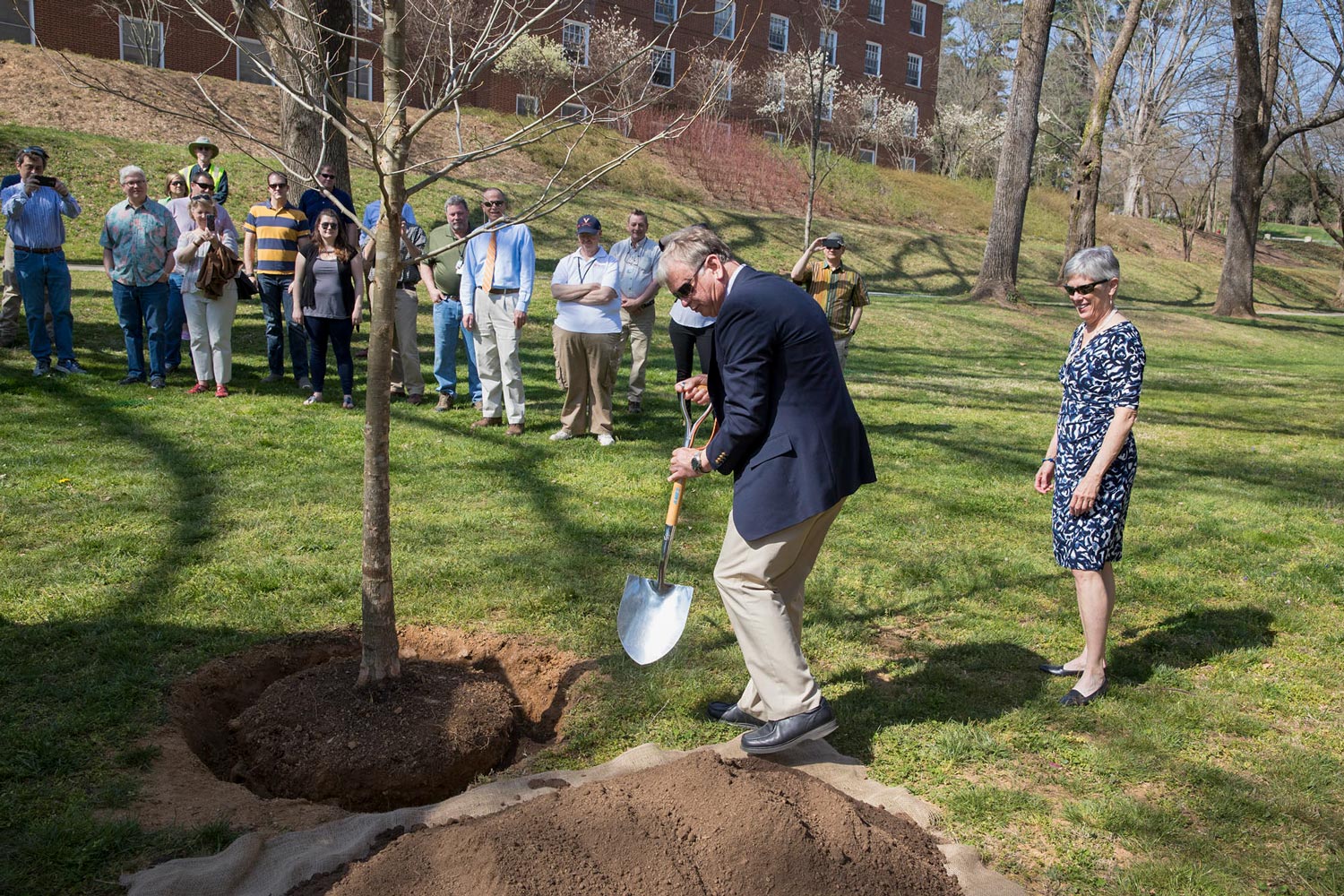
A sycamore tree was planted near the Dell tennis courts.
Sitler is retiring from UVA’s Facilities Management department after more than 20 years of service, in which he led innovative changes to the University’s stormwater management practices and educated students and tour groups about green infrastructure and water quality issues.
Later on Friday, Sullivan and other UVA leaders dedicated Yen House, a dormitory in UVA’s International Residence College formerly known as Lewis House. The building was renamed to honor Yan Huqing, known as W.W. Yen, who became the first Chinese student to earn a degree from UVA when he graduated in 1900. He went on to serve as China’s first ambassador to the Soviet Union and delegate in the League of Nations before serving as China’s premiere five times.
Below, read more from each medalist’s public talk and the Yen House dedication.
Adjaye Walks Audience Through Some of His Most Exciting Projects
Sir David Adjaye, OBE, spoke with students and community members on Friday afternoon after receiving the Thomas Jefferson Foundation Medal in Architecture.
School of Architecture dean Ila Berman introduced Adjaye as “truly one of the most prominent and creative designers of his generation.”
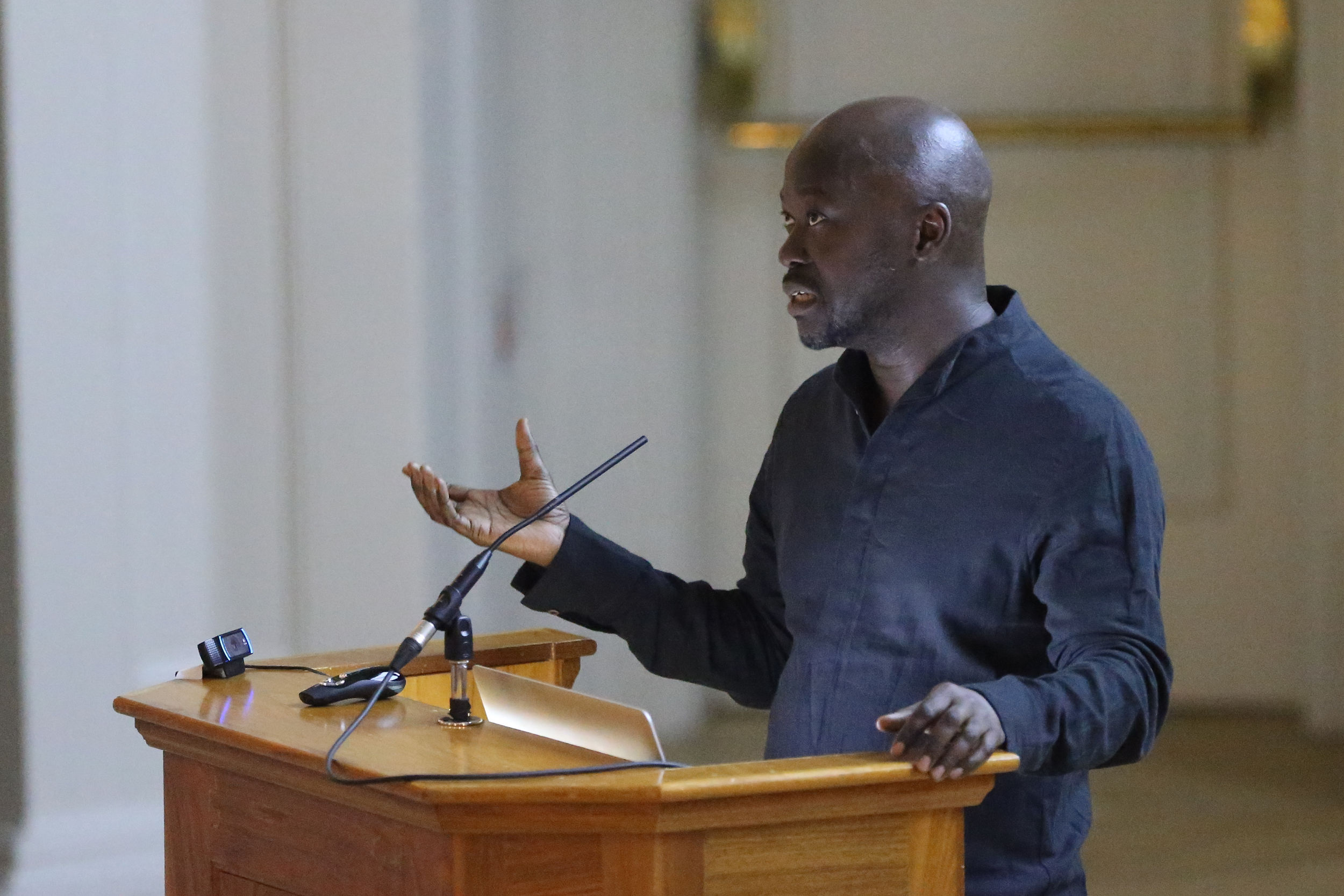
Sir David Adjaye (Photo by Richard Dizon, University Communications)
Adjaye, who was knighted by Britain’s Queen Elizabeth II for services to architecture, has left his mark on major projects around the world. One of his best-known projects to date is the $540 million Smithsonian Institution National Museum of African American History and Culture, completed in collaboration with the project team Freelon Adjaye Bond/Smith Group.
As he took the stage in Old Cabell Hall, Adjaye told the crowd that he had been looking forward to seeing the UVA’s architecture in person.
“I am thrilled to finally come to this campus that I have admired for very long, and I cannot think of a better way to come than to have received this medal,” he said.
He focused his presentation on three of his projects – one complete and two ongoing. For each, Adjaye shared his drawings and renderings and walked the audience through the decision-making process that went into the final design.
The first was the Studio Museum in Harlem, a 50-year-old Harlem institution that showcases the work of artists of African descent. Adjaye’s design, which will replace an older building the museum had outgrown, features a modern, modular aesthetic that will create a visually arresting center on Harlem’s 125th street while providing plenty of space for art exhibitions and education. It is expected to complete in 2021.
Next, he took the audience on a virtual tour of the National Museum of African American History and Culture, for which he was the lead designer. It was a massive undertaking that took nearly 10 years and opened to widespread interest and acclaim in 2016.
Adjaye said his design, highlighted by a striking three-tiered exterior wrapped in an ornate bronze corona, was in many ways inspired by the art and artifacts housed in the museum, the stories they tell about Africa and the African-American experience in America and the museum’s mission of finally sharing those stories in a prominent place on the National Mall.
“This museum tries to make this history of invisibility visible,” he said. “For me, the building became more than just a museum, it became a building which was a memorial, a museum and a monument, three systems organized in one.”
The final project Adjaye highlighted is a new commission for the National Cathedral of Ghana in Accra, Ghana. His design was unveiled in March as part of a ceremony marking the country’s 61st year of independence from Britain. The large, modern cathedral will be interdenominational, serving people of all faiths. It will also provide a beautiful space for state functions like inaugurations or state funerals.
Adjaye said the cathedral is part of Ghanaian president Nana Akufo-Addo’s mission to make the country “a beacon of an African renaissance.”
Fowler Discusses Preserving the Global Food Supply
Morgan Carrington “Cary” Fowler Jr., the 2018 recipient of the Thomas Jefferson Foundation Medal in Citizen Leadership, has “devoted his career to safeguarding the world’s food supply,” Allan Stam, dean of the Frank Batten School of Leadership and Public Policy, told students on Thursday.
Fowler, an American agriculturalist, spoke with students Thursday afternoon about founding and leading the Svalbard Global Seed Vault, an Arctic facility that stores more than 930,000 unique crop varieties in a vault protected by permafrost and rock.
“This facility takes in duplicate copies from seed banks around the world and stores them in a safe, secure location, forever and for free,” Fowler said.:
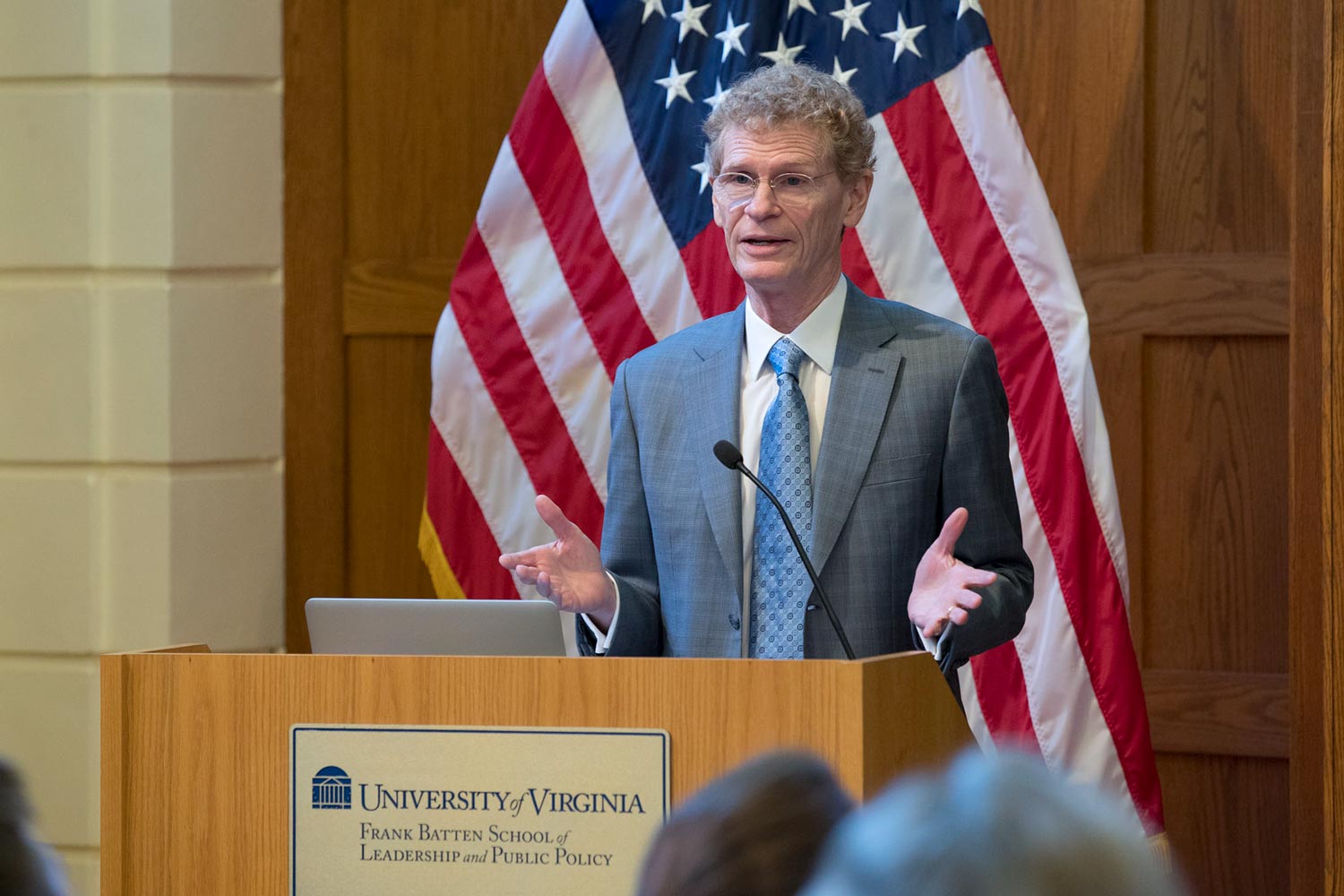
Fowler is known as the “father” of the Svalbard Global Seed Vault, which he called one of his favorite places in the world.
The seed bank is buried in a mountain near Svalbard, a Norwegian archipelago that is the northernmost destination for any commercial airline. It keeps the seeds at minus-18 degrees Celsius, safeguarding them for up to 20,000 years, depending on the crop variety.
There are seeds from 234 countries, representing nearly every crop in the world. The seeds can be used to replenish crop varieties that are at risk for extinction and supplement the global food supply.
“This room has, by some definitions, the largest collection of biodiversity on earth,” Fowler said, showing students a picture of the vault. “It really is the foundation of agriculture; humanity really does depend on it.”
Fowler and his team believe Svalbard is among the safest – and coldest – locations on Earth for the seed vault. Other seed vaults around the world are at risk from natural disaster or man-made conflict. Svalbard told students of one prominent vault in Aleppo, Syria that he helped evacuate, getting the last seeds out about two weeks before the fighters overtook the facility.
More generally, he said, global agriculture is at risk due to dwindling water supplies, shortages in land and nutrients and climate change, which Fowler said worries him most of all.
“Agriculture faces the largest number of serious challenges since the dawn of agriculture, really,” he said.
He sees the Svalbard Global Seed Vault and other efforts to preserve crop diversity as a key step in protecting agriculture and preparing for whatever unknown changes the future might bring.
“I don’t know what kind of agricultural system we will have 500 years from now,” Fowler said during the question-and-answer portion of the event. “But, any system I can conceive of will require genetic diversity. The best I can do right now is try to conserve that diversity.”
By Caroline Newman
Judge Doubts Supreme Court Bias Favoring Business
A federal appeals court judge, during a talk at the School of Law on Thursday, cast doubt on the idea that the U.S. Supreme Court makes decisions on business cases along ideological lines, or that the court is pro-business at all.
Judge Frank H. Easterbrook of the U.S. Court of Appeals for the Seventh Circuit, this year’s recipient of the Thomas Jefferson Foundation Medal in Law, painted the high court as more likely to be politically agnostic than polarized in business cases, contrary to recent high-profile research.
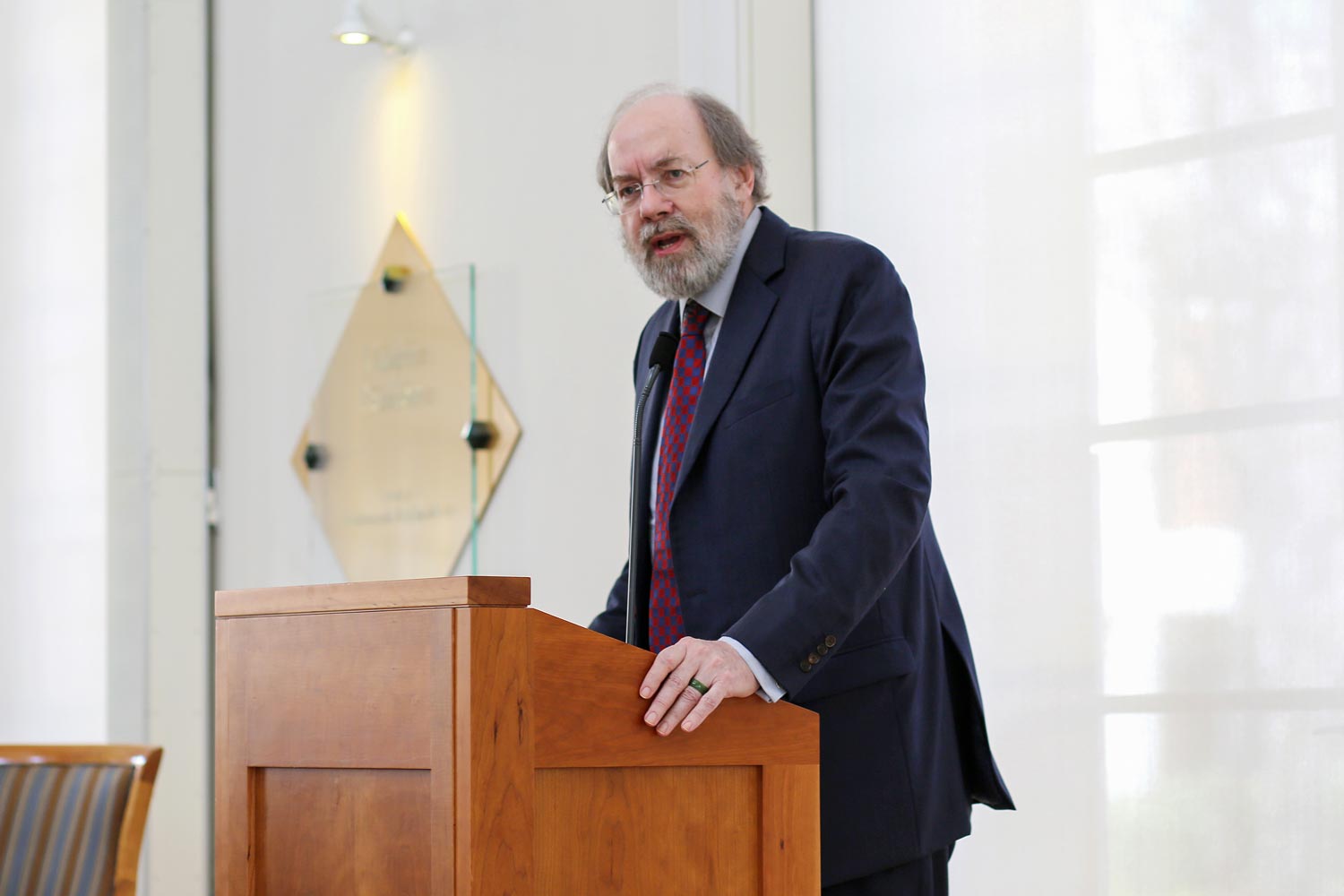
Judge Frank H. Easterbrook spoke at the School of Law on Thursday before receiving the Thomas Jefferson Foundation Medal in Law.
“The world is more complex than left and right,” Easterbrook said.
Easterbrook referenced a recent big-data study that sought to analyze whether justices were increasingly favoring business interests in their rulings. The study crunched decision data between 1946 and 2012. It looked at whether businesses won or lost their cases at the Supreme Court, and whether the results were “liberal” or “conservative.”
“They needed to simplify in order to process larger quantities of data,” Easterbrook said. “They found that the success of business litigants fell during the Warren Court, and has climbed since [1969].”
The study seemed to confirm that the justices became more pro-business over time, and the current court under Chief Justice John Roberts appeared more conservative in such cases than its predecessors.
Easterbrook, one of the most-cited appellate judges in the nation as well as a faculty member at the University of Chicago Law School, disputes the study, however.
“Businesses lose major decisions about as much as they win,” he countered.
One reason for the misunderstanding, he said, was how his colleagues’ research was conducted. The methodology for coding such a large data set failed to recognize nuances that might have flagged a case as business-related, or not, he said as one example.
He added that within a set of business cases, many are won on procedural issues that have nothing to do with ideology.
He further stressed that all business cases are not equally important, because they don’t all have the same impact on the business world.
Easterbrook cited his own research published in 1984, which he derived by sampling dockets from each of the three decades prior, as well as his more modern observations. Among his findings:
- About a third of the Supreme Court’s business cases are about procedural, rather than substantive, issues.
- Less than a third of all business cases are about economic issues. More than a third can’t be classified on a liberal/conservative basis.
- Business litigants are convincing the Supreme Court to grant review more often because of the justice’s collective interest in such cases, which by default increases businesses’ success rate.
- In many cases, a win for the business may also be a win for the consumer.
- Relatively few cases involved open-ended constitutional questions, and the ones that did resulted in an even split for businesses.
Of the majority of cases, Easterbrook said, “These decisions come out of where the [legislatively] enacted text leads.”
He also cited decisions in which Justice Ruth Ginsburg seemingly wrote a “conservative” opinion, while the late Antonin Scalia, a former UVA Law professor, seemed to have written a “liberal” one.
Regardless, Easterbrook found the notion of Roberts, after becoming chief justice, exercising sway over Scalia’s written opinions – per the perceived trend – to be highly unlikely.
“No one else has accused Justice Scalia of being the weak-minded sort who can be easily manipulated by his colleagues,” Easterbrook said. “Surely he learned better than that when he was a faculty member here.”
While he acknowledged his own research involved greater subjectivity than his colleagues’ study, Easterbrook said it is precisely that subjectivity that provides the needed clarity.
Easterbrook was named to the Seventh Circuit, which covers Illinois, Indiana and Wisconsin, in 1985. He served as its chief judge and a member of the Judicial Conference of the United States from 2006 to 2013. He is well-known for his writing in the field of corporate law, and for his excellence in legal writing in general. In a brief question-and-answer session that followed the talk, the judge gave law students advice about writing.
By Eric Williamson
Dedication Ceremony Celebrates University’s First Chinese Graduate
Friday’s celebration also included the dedication of a building at UVA’s International Residential College. Formerly Lewis House, the unveiling of a commemorative plaque on the brick façade signaled its renaming to Yen House to honor Yan Huiqing, known as W.W. Yen.
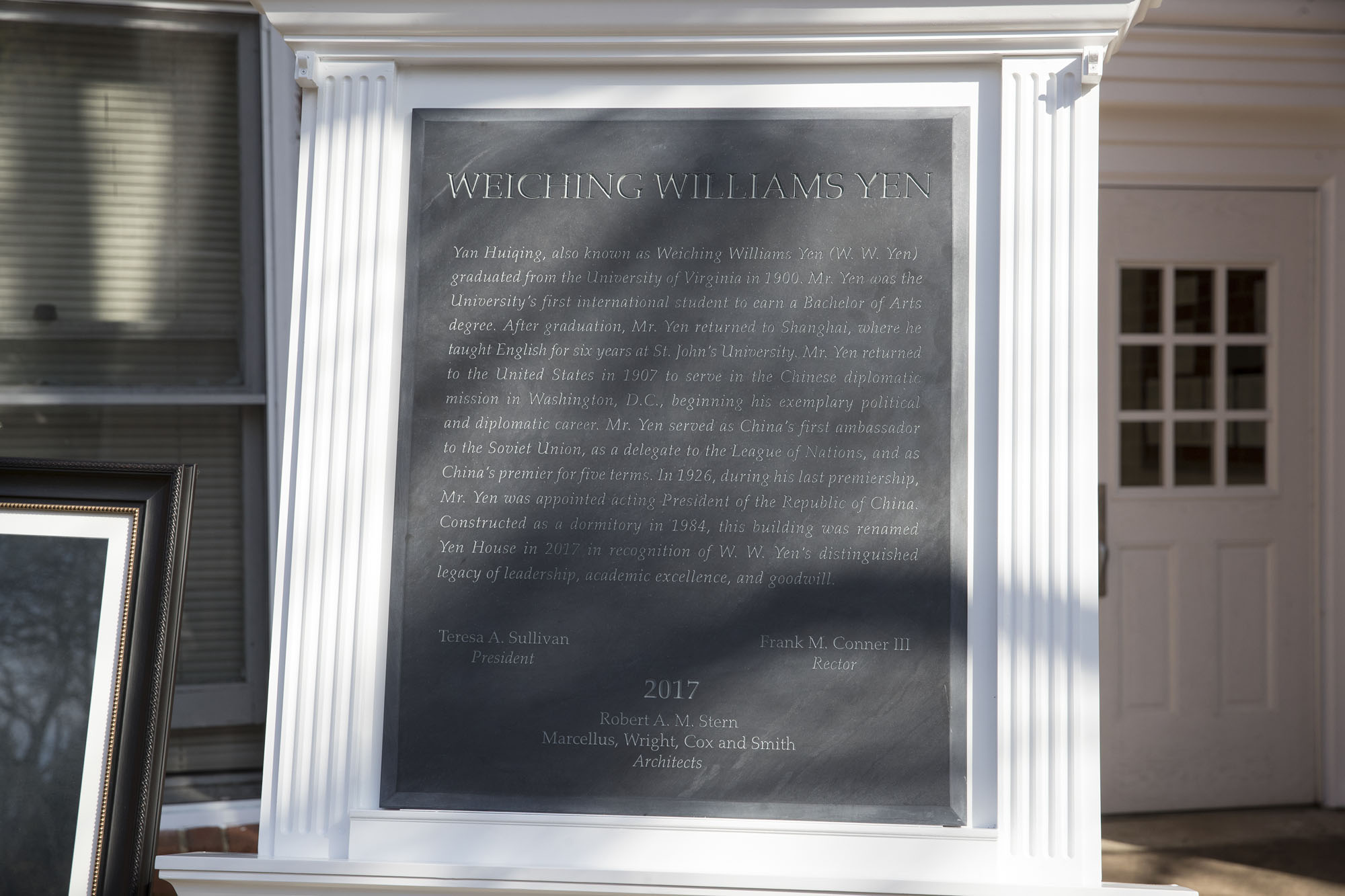
The plaque is inscribed with the history of W. W. Yen. (Photo by Dan Addison, University Communications)
Yen was the first Chinese student to earn a degree from UVA. Graduating in 1900, he is also the first international student to earn a Bachelor of Arts degree from the University. Yen went on to serve as China’s first ambassador to the Soviet Union and as a delegate in the League of Nations before serving as China’s premier five times.
Speaking to several gathered for the ceremony in the afternoon sunlight, Sullivan called Yen a “true pioneer.”
“In his career and public life, W.W. Yen embodied the best qualities that we strive to instill in UVA students today,” she said, those being “intellectual curiosity; academic excellence; appreciation of other cultures, diplomacy and respect for people from other nations. Mr. Yen was a true global citizen long before ‘global citizen’ became a fashionable term.”
Among those in attendance was Cen Jianjun, the minister counselor for education from China’s embassy in Washington, D.C.
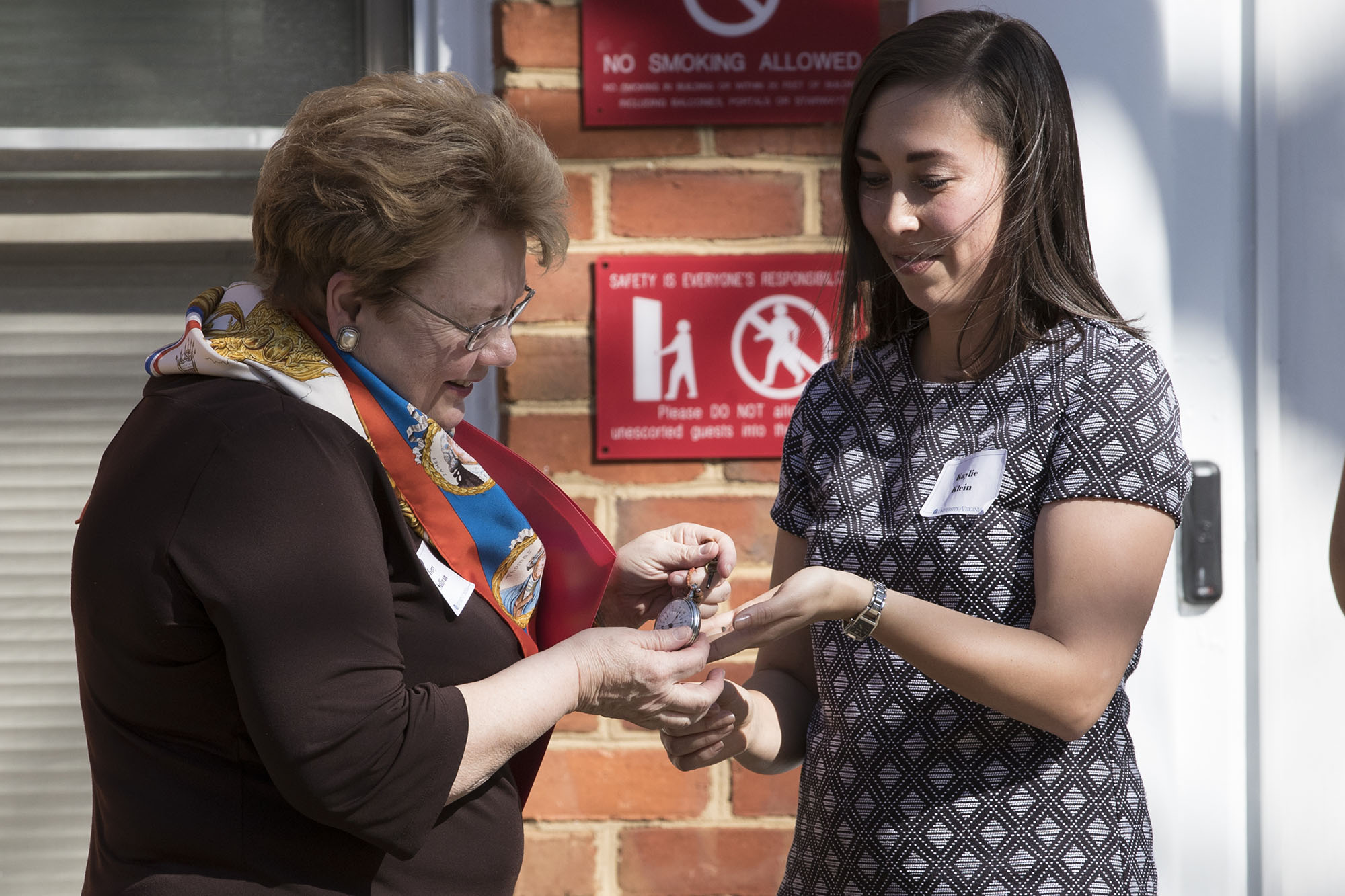
Kaylie Klein presented President Sullivan with W.W. Yen’s pocket watch during the ceremony in the breezy, sun-dappled courtyard at the International Residential College.
Many relatives of Yen were also there. Among them were UVA Law Professor George Yen, who recently learned he is a grand-nephew of Yen; Diana Yen, a current UVA fourth-year student majoring in economics and politics, who is the great-granddaughter of W.W. Yen’s first cousin; and Kaylie Klein, the great granddaughter of W.W. Yen, who presented Sullivan with a pocket watch that belonged to Yen.
By Jane Kelly
Media Contact
Article Information
April 13, 2018
/content/founders-day-uva-celebrates-achievement-fields-jefferson-admired

